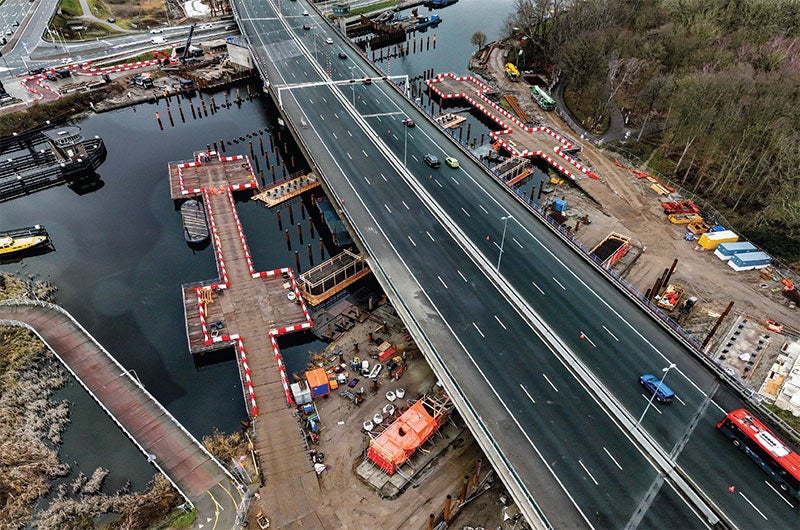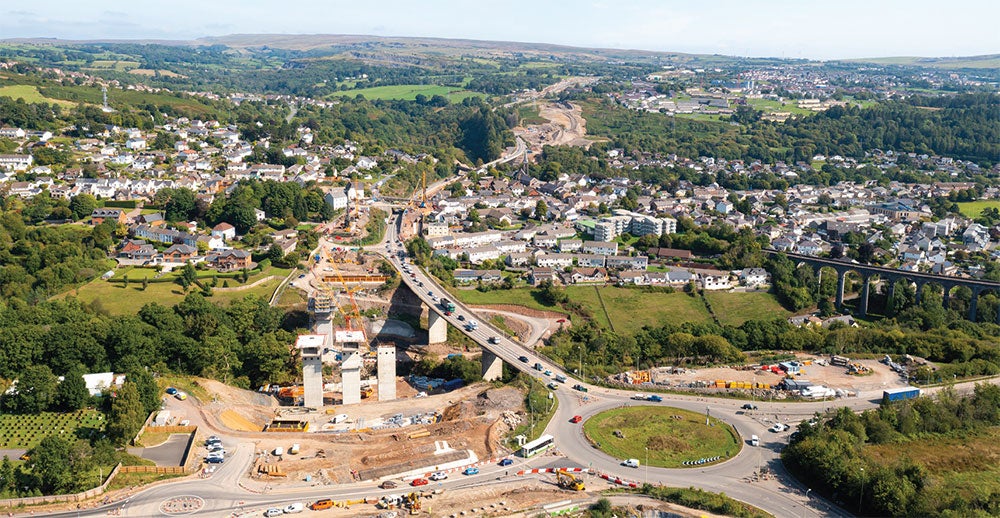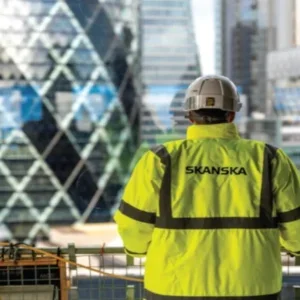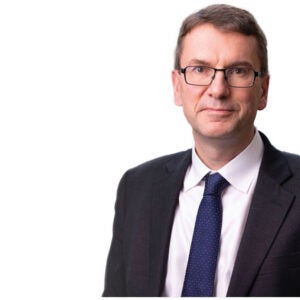
Early in our conversation, María Carrasco expresses concern that I won’t have enough to write about. “I don’t think I’m going to tell you anything very interesting,” is how she half-jokingly puts it, suggesting I could hear whatever she says from any number of CFOs. As it turns out, the opposite is true: as an interviewee, Carrasco is engaging and witty, hopping nimbly from finance to sustainability to spending time with her daughters after a hard week at work. And even if she’d turned out to be a reporter’s worst nightmare, Carrasco would doubtless still be worth an article: simply by virtue of her job title.
The finance director at FCC Construcción, Carrasco is central to one of the most sophisticated enterprises in global engineering. Building from Belgium to Peru, along the way completing 1,650 bridges and 10,000km of highway, Carrasco’s employer is one of Europe’s premier construction firms – and that’s even before you factor in its parent company. A constituent part of Fomento de Construcciones y Contratas, thankfully abridged to the FCC Group, FCC Construcción is a vital cog in a conglomerate that last year brought in over €7bn and is sometimes listed as one of the top 15 construction firms on earth. Together with the industry’s traditionally diffuse nature, it soon becomes obvious that Carrasco’s job is anything but boring.

Yet, if the CFO is certainly wrong about her journalistic redundance, it likely is true that the outlines of Carrasco’s career do match those of her counterparts at other businesses. No longer simply there to count out numbers, in recent years she’s transformed herself into a sustainability champion, liaising with the United Nations to bolster FCC’s green commitments. Like many other finance leaders, moreover, Carrasco is increasingly obliged to step away from her Madrid headquarters, working with colleagues across the company to fully appreciate her firm’s financial landscape. Together with a suite of digital tools redolent of her profession and it can almost be tempting to take Carrasco at her word – until you recall just how bewilderingly comprehensive FCC’s operations truly are.
Come and FCC
Across a 20-year career, Carrasco has lived through a financial revolution. When she started at FCC, cutting her teeth as an internal auditor in the early 2000s, she recalls that IT tools and systems were “decentralised” across dozens of countries and hundreds of sites, to the extent that if she wanted the financial figures of a particular job, she was obliged to ask far-flung managers for paper copies of financial information down the phone. Now, of course, everything is different. Change started rumbling down the track back in 2007, the year FCC Group decided to implement an SAP-backed restructuring of its finance function. “SAP is ‘big brother’,” Carrasco wryly explains, noting that these days she can now orchestrate the multiplicity of FCC Construcción’s cost control from the comfort of her office.
Over more recent times, meanwhile, SAP has been joined by similar programmes – all aimed at bolstering the firm’s financial battle stance. In particular, Carrasco highlights Primavera, an Oracle tool that allows her team to track the costs at particular building sites, as well as ensure that schemes are running to schedule. That’s of a piece, she adds, with the technological avalanche sweeping her industry more widely. With design tools like BIM allowing engineers to model vast buildings before a single brick is even laid, she says that “customers are pushing to use tools like this”. If nothing else, that’s a fair point when you cast your eye across to other construction giants. Across the Pyrenees in France, for instance, Bouygues has long relied on a partnership with Accenture. On the far side of the Channel, players from Kier to Galliford rely on a cavalcade of different fintechs.
For her part, Carrasco is obviously conscious of how intensely she can gaze into FCC’s financial soul. “It’s true that we are the owner of the information of the company,” she concedes. “And that’s something that gives you a lot of power.” If she now enjoys far more visibility than her younger self could ever have imagined, however, Carrasco remains typically modest about what it all means in practice. As she puts it with characteristics bluntness: “We are not so smart.” Stressing that the finance function doesn’t exist in a vacuum, any more than it did in the old days of paper reporting, Carrasco explains that her role requires careful and constant collaboration. “I always say that we are the main customer of the IT department,” is how she puts it. “We are the best friends of the sustainability manager. We have to collaborate with human resources – and operational areas demand information from us.”
Keeping account
In September 2020, FCC Construcción made a striking announcement. Joining such business luminaries as Unilever and Pirelli, it became the first construction firm to sign up to the UN’s Sustainable Finance and Investments group. Aimed at steadying corporate resolve for the environmental battles ahead, the group aims to promote collaboration between businesses and their external partners: among them investors, banks and credit rating agencies. Speaking to Carrasco, it’s hard not to be struck by the breadth and ambition of the UN scheme. “The first goal,” she emphasises, “is to get investors to do sustainable projects.”

With global corporate investments hitting the $14tn mark each year, there’s certainly plenty of space for a more sensitive approach to where funds end up. But perhaps most striking of all is just how important CFOs like Carrasco are to prodding things along. Indeed, if openness is a vital part of the Spaniard’s job from HR to IT, nowhere is this attitude more needed than the knotted question of sustainability. That’s clear, for instance, around financial reporting. By liaising with other CFOs in the UN network, Carrasco is ensuring that the language used to describe ESG at FCC Construcción can easily be compared to a single cross-industry standard. That, she explains, makes it easier for “investors or journalists” to understand if a company really is promoting environmental causes – or just fiddling the statistics for the sake of their reputation.
That’s shadowed, Carrasco continues, by her legislative work. In law since last year, new EU legislation obliges companies to disclose the scale of their sustainability work, along the way helping environmentally-minded investors decide where to put their money. With that in mind, Carrasco decided to adapt her trusty SAP platform, adding a feature whereby stakeholders must state exactly what they’re doing to help the planet. More to the point, examine FCC Construcción’s website and this innovation already seems to be bearing fruit. For one thing, the company successfully cut its water and CO2 emissions through 2022. For another, it drastically increased the amount of soil and debris it recycled in projects globally. That’s echoed by work at specific sites. While building the tram system in the Spanish city of Zaragoza, for example, FCC engineers were careful to crush the leftover concrete in such a way that meant it could be used to fill embankments – and even go towards building the tram platforms themselves.
Keep on building
These upheavals are doubtless boosting Carrasco’s profile in FCC’s C-suite. “Of course, [CFOs] have an important role in any company,” she says. “And I think it’s because we are the owners of the information – and information is power.” All the same, in her self-deprecating way, the executive is reluctant to imply that her more wide-ranging role has really changed. As she laughingly puts it, the CEO is still the final “decision-maker” at the top of FCC’s corporate mountain, while Carrasco herself still demands information from managers just as she did 20 years ago. “‘Again, María is asking for something!’” is her teasing impression of worn-out FCC colleagues, adding that if sustainability statistics are a new demand from the finance team, they’re not fundamentally different from older requests around suppliers or costs.
You could say something similar of Carrasco’s time outside the office. Departmental scourge she may be, but this mother of two has managed to maintain remarkable consistency in her home life, noting that she tries to take her daughters to school every day. It’s the same story once the week is done. “I get home late and maybe don’t spend so much time with them,” Carrasco explains. “But from Friday to Monday, I spend the weekend with them.” Apart from re-energising her professionally, these attitudes surely offer Carrasco a sense of perspective. Asked how the finance function might change in another 20 years, four decades on from her arrival at FCC, she smiles. “I hope to be retired.” Given how much the CFO has achieved in her career so far, part of you hopes it’s just another joke.






